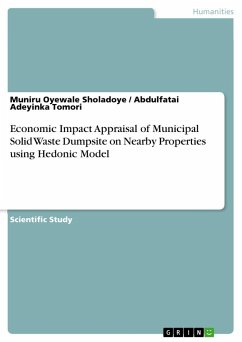
Who Should Accept The Waste?
Contestations over Dumpsites in the Greater Accra Region of Ghana
Versandkostenfrei!
Versandfertig in 6-10 Tagen
27,99 €
inkl. MwSt.

PAYBACK Punkte
14 °P sammeln!
The title of this paper points to a conflict situation and indeed that is the message it is meant to convey. However, beyond the core message, this paper discusses the ways waste management in the urban areas of Ghana generates conflict among all stakeholders - residents of waste-receiving communities and their leaders, waste management authorities of Accra Metropolitan Assembly, the Environmental Protection Agency and private waste management companies. This paper provides some recommendations to reduce such conflicts. In one of the study communities, when a community elder was asked to expla...
The title of this paper points to a conflict situation and indeed that is the message it is meant to convey. However, beyond the core message, this paper discusses the ways waste management in the urban areas of Ghana generates conflict among all stakeholders - residents of waste-receiving communities and their leaders, waste management authorities of Accra Metropolitan Assembly, the Environmental Protection Agency and private waste management companies. This paper provides some recommendations to reduce such conflicts. In one of the study communities, when a community elder was asked to explain why residents of his community had blocked the only access road and prevented waste disposal vehicles from dumping waste at the nearby dumpsite, he angrily retorted thus: Who should accept the waste? Tell the drivers to take the waste back to Accra, to those who generated it. Why should we accept the waste? We are fed up! Clearly, this response is pregnant with several cross-cutting issues. Most significantly, this paper addresses the issue of contestation between local communities and powerful state bureaucratic institutions in the management of urban waste.












